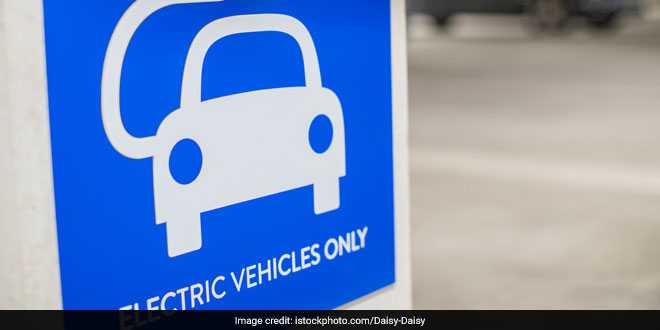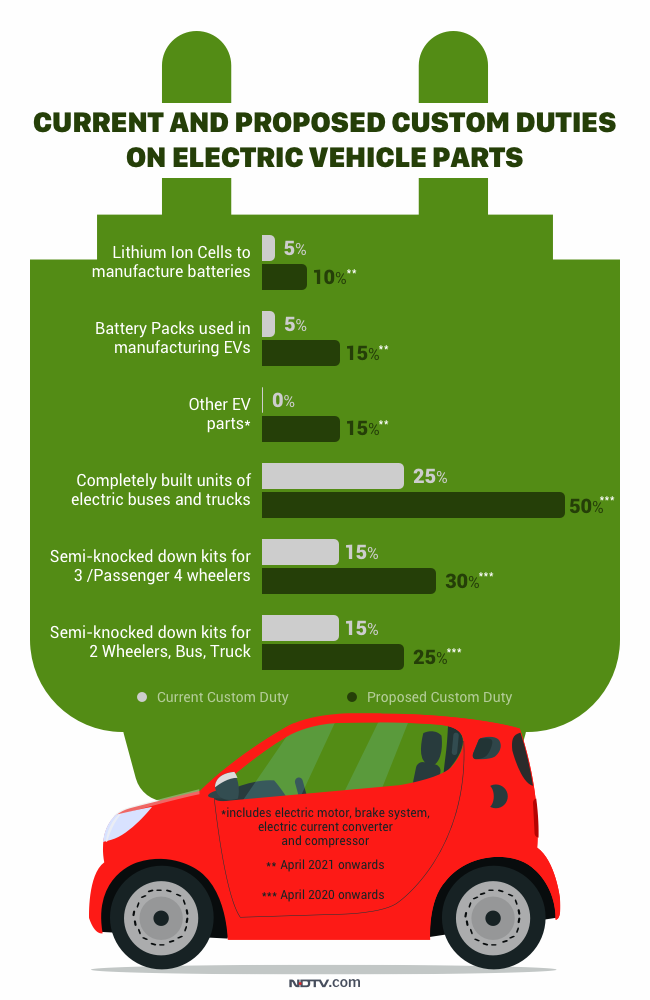New Delhi: In a move to promote local manufacturing of electric vehicles, the government has notified that the basic import duty on electric vehicles and their parts will be increased from April 2020. This move is a part of phased domestic manufacturing programme for electric vehicles which was approved by the Union cabinet last week under the National Mission for Trans-formative Mobility (NMTM). NMTM is aimed towards promoting clean mobility alternatives and encourage localised manufacturing of electric vehicles and Amitabh Kant, CEO NITI (National Institution for Transforming India) Aayog has been given a charge to lead the mission.
Also Read: Cabs In India Go Electric As Service Providers Start Investing In Electric Mobility
As per the Department of Heavy Industries (DHI) under the Ministry of Heavy Industries and Public Enterprises (MoHIPE), parts used in manufacturing electric vehicles will attract basic customs duty (BCD) of 15 per cent from April 2021 onwards. There are no customs being levied on EV parts such as AC or DC charger, motor and motor controller, and power control unit. The battery packs and the Lithium-ion cells used in manufacturing the battery packs are currently being taxed at 5 per cent import duty each. However, with effect from April 2021, the BCD on battery packs used in manufacturing electric vehicles will be tripled to 15 per cent and Lithium-ion cells will have doubled duty of 10 per cent.
The BCD on completely built units of electric buses and trucks will be doubled to 50 per cent from the current 25 per cent with effect from April 2020, which according to experts will give a significant push to domestic manufacturers of these vehicles. Along with this the semi-knocked down kits for all-electric wheelers (including passenger and commercial vehicles) being import-ed from other countries to be assembled in India will also attract an increased BCD of 25 to 30 per cent from the current 15 per cent.
According to MoHIPE, these hikes in customs duties to be implemented from April 2020 in phases, are aimed to create a robust indigenous EV manufacturing base in the country. Wel-coming this move Ravneet Phokela, Chief Business Officer, Ather Energy said,
The emphasis of the central government on local sourcing, is bound to aid automakers to invest in building a sustainable production ecosystem. The support for domestic manufacturing is much needed and will help Indian automakers build vehicles locally. The incremental scale of import duty from 5% to 15% on lithium-on batteries at the end of 2022 will drive original equipment manu-facturers to fast-track their investments in the infrastructure now. This is exactly what the EV industry needed at this stage.
As per Sohinder Gill, Director General, Society for Manufacturers of Electric Vehicles (SMEV), the way to trigger ‘make in India’ EV products is to put the first few lakh EVs on the market with their prices closer to the petrol ones through policy interventions which will automatically at-tract business houses to start investing in EV components. He further stressed on building up a sustainable ecosystem for the EV industry which is still in nascent stage. He said,
While imposing the import duties on EV components, it is important that the govern-ment consider the volumes and not a timeframe. More than 20 members of SMEV are compo-nent makers and want to enter into the business of EV components such as motors, controllers, batteries or even lights and moulded parts, only to realise that the volumes being so low, it does not make any business at all. The few who come forward quote exorbitant prices making EVs even costlier driving their volumes down. Therefore the localisation is more a matter of volumes than a function of time.
In a bid to increase the volume of EVs in the country the government approved the second phase of Faster Adoption and Manufacturing of Electric Vehicles in India (FAME II), last month with an outlay of INR 10,000 crore to be implemented over a period of three years starting from April 1, 2019. These efforts are in line with the central government’s target of having at least 30 per cent vehicles on road as electric by 2030. The scheme proposes to support about 10 lakh two-wheelers, 5 lakh three-wheelers, 55 thousand four-wheelers, and 7 thousand buses, that has lithium-ion batteries or newer technology batteries fitted on it, across India. FAME II scheme also aims to set up of 2,700 charging stations across the country.
NDTV – Dettol Banega Swachh India campaign lends support to the Government of India’s Swachh Bharat Mission (SBM). Helmed by Campaign Ambassador Amitabh Bachchan, the campaign aims to spread awareness about hygiene and sanitation, the importance of building toilets and making India open defecation free (ODF) by October 2019, a target set by Prime Minister Narendra Modi, when he launched Swachh Bharat Abhiyan in 2014. Over the years, the campaign has widened its scope to cover issues like air pollution, waste management, plastic ban, manual scavenging and menstrual hygiene. The campaign has also focused extensively on marine pollution, clean Ganga Project and rejuvenation of Yamuna, two of India’s major river bodies.





























